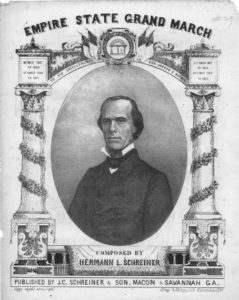Eight years after Abraham Lincoln was nominated for U.S. President at the Wigwam the Republican party returned to Chicago for its National Convention. This time the meeting was held at Crosby’s Opera-house, which was able to hold about 2500 spectators in addition to the 650 delegates. Actually, according to Harper’s Weekly, 25,000 people were in town for the convention; the hotels “were crowded to suffocation, although they had run up their charges to $20 per day in anticipation of the crush.” When the convention began on May 20th one of the first tasks was to select Joseph R. Hawley, former civil war general and ex-governor of Connecticut as the permanent president of the convention. There wasn’t even standing room in the opera-house.
150 years ago today the convention unanimously nominated Ulysses S. Grant as its presidential nominee on the first ballot. The opera-house exploded with a celebration.
From the June 6, 1868 issue of Harper’s Weekly (page 362) (at the Internet Archive):
On the nomination of General GRANT by General JOHN A. LOGAN, the wildest enthusiasm prevailed; but when, after the roll of States had been called, the President announced that General GRANT had been nominated without opposition and without a dissenting vote, the vast audience rose to their feet, and cheer upon cheer was given for the nominee. The men, in their excitement, threw up their hats, yelled, and cheered; the women waved their handkerchiefs, and the band sent forth the sweet strains of a patriotic air.
During this excitement a scene was shifted at the rear of the stage representing General GRANT stationed on one of the pedestals of the front of the White House, on which was inscribed “Republican nominee of the Chicago Convention, May 20, 1868.” The other vacant pedestal was inscribed, “Democratic nominee, New York Convention, July 4, 1868.” The Goddess of Liberty stood between the two with one hand pointing to GRANT, and the other to the vacant pedestal, and above all were the words, “Match him.” In the height of the excitement a dove, painted in red, white, and blue, was let loose, and it flew forth from the stage over the heads of the assemblage.
RECEPTION OF THE NEWS THROUGHOUT THE COUNTRY.
From all parts of the Union came indications of the popularity of the ticket in the enthusiasm of the people for the nominees. In various cities of the country the announcement of the nomination was greeted with the firing of guns, while throughout the country the news was circulated not less thoroughly if with somewhat less rapidity. One of our artists sends us a sketch of the reception of the news in the country, which we give on page 364.
You can read more details about the meeting in Presidential Election, 1868 : Proceedings of the National Union Republican Convention, Held at Chicago, May 20 and 21, 1868 (at the Internet Archives). New Jersey Governor Marcus Lawrence Ward called the convention to order on May 20th and provided a good summary of the Republican Party’s achievements in its brief fourteen year history – “a record of the true progress of the nation.” There was time for a speech from Georgia delegate, ex-Democrat, and ex-Civil War Governor Joseph E. Brown, who was an “original secessionist” but by 1868 a “reconstructed rebel.” This report didn’t mention the patriotic dove or the figure of General Grant on his pedestal, but after Grant was unanimously nominated, the band reportedly played “The Battle Cry of Freedom.” Eleven candidates originally vied for the Vice-Presidential nomination. After five ballots and some adjustments U.S. House Speaker Schuyler Colfax was picked as the general’s running mate.
____________________________________________

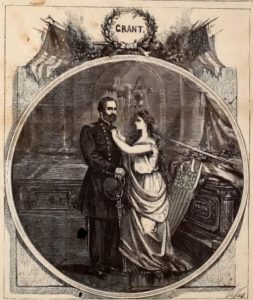
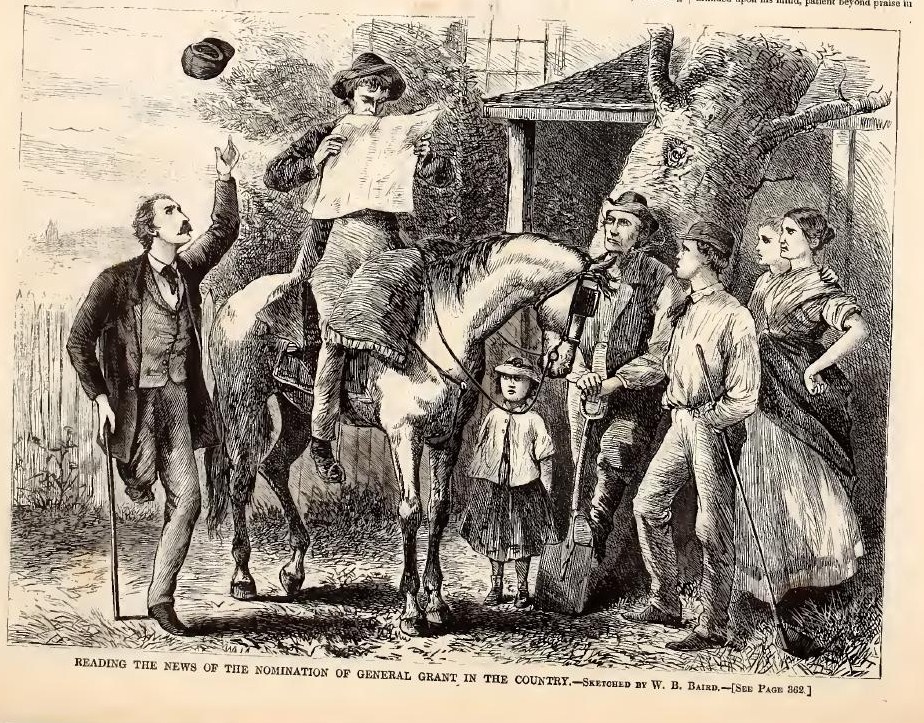
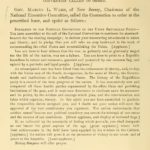
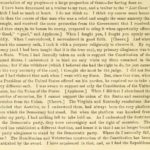
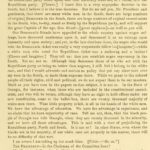
![The battle-cry of freedom. [Philada. May 16, 1861.] (LOC: https://www.loc.gov/item/amss.cw100370/)](https://www.bluegrayreview.com/wp-content/uploads/2018/05/1606-201x300.jpg)
